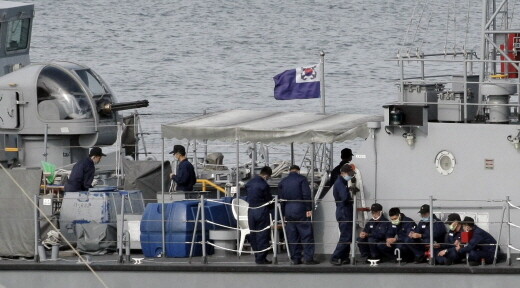hankyoreh
Links to other country sites 다른 나라 사이트 링크
Measures needed to prevent future West Sea conflicts

Gun smoke has once again risen over the West Sea. South Korea displayed its overwhelming firepower and defended the NLL, and now tensions have escalated to even higher levels. Observers are saying the G-20 summit to be held in Seoul next Nov. could at the slightest mistake be blemished by a military clash in the West Sea. In other words, there is concern that North Korea could launch a return match to mark the one-year anniversary of the “Third West Sea Naval Battle” fought on Tuesday.
Some observers are saying that while South Korea maintains a steely level of military preparedness, it must also show renewed interest in finding a way to reduce tensions in the West Sea, a search that was suspended when the Lee Myung-bak administration came to power.
Systemic efforts to bring peace to the West Sea hit their high point in the October 4 2007 Summit Declaration. At the time, the leaders of North Korea and South Korea said they had decided to declare a joint-fishing zone in order to prevent accidental clashes in the West Sea. They also put forward plans to turn the West Sea into a zone of peace and cooperation rather than a conflict zone through the establishment of direct shipping lanes to the North Korean port of Haeju and the construction of an industrial complex in the city.
In the defense ministers’ summit and generals’ talks that followed, however, the two sides could not overcome their differences regarding the NLL and failed to establish a joint fishing zone or zone of peace. With the taking power of the Lee Myung-bak administration, which has advocated adhering to the NLL, follow-up efforts to push a West Sea special zone of peace and cooperation have been completely suspended.
Even working-level mechanisms that had been in place to prevent accidental clashes in the West Sea have been suspended since President Lee took office. During the inter-Korean general-level talks of June 2004, the two sides agreed to set up a wireless communication net between opposing patrol boats and install three direct phone lines between the two militaries in the West Sea to exchange information pertaining to illegal fishing boats. Since President Lee has taken office, however, wireless communications have not taken place as inter-Korean relations have remained deadlocked. The telephone lines were also cut by North Korea in May of last year, citing faulty lines. They have yet to be restored. Last month, South Korea offered to provide materials and equipment to improve the lines, but whether the lines, the object of which is to prevent accidental clashes in the West Sea, will operate again is unknown.
The Lee administration is still stressing only military preparedness. Cheong Wa Dae (the presidential office in South Korea or Blue House) Spokeswoman Kim Eun-hye said Wednesday concerning the naval clash that the South Korean government has taken a number of security precautions so that people do not feel insecure, but that Seoul does not want the incident to worsen inter-Korean relations. A key government official said that because sticking to the NLL is the government’s principle there will not be further talks with North Korea about establishing a joint fishing zone.
An expert at one policy think tank, however, says that military clashes themselves provoke the international community’s sense of insecurity regarding the Korean Peninsula, and to prevent them, it is necessary to have not only military preparedness, but also structural efforts in place to establish peace in the West Sea.
Please direct questions or comments to [englishhani@hani.co.kr]
Editorial・opinion
![[Column] Season 2 of special prosecutor probe may be coming to Korea soon [Column] Season 2 of special prosecutor probe may be coming to Korea soon](https://flexible.img.hani.co.kr/flexible/normal/500/300/imgdb/original/2024/0426/3317141030699447.jpg) [Column] Season 2 of special prosecutor probe may be coming to Korea soon
[Column] Season 2 of special prosecutor probe may be coming to Korea soon![[Column] Park Geun-hye déjà vu in Yoon Suk-yeol [Column] Park Geun-hye déjà vu in Yoon Suk-yeol](https://flexible.img.hani.co.kr/flexible/normal/500/300/imgdb/original/2024/0424/651713945113788.jpg) [Column] Park Geun-hye déjà vu in Yoon Suk-yeol
[Column] Park Geun-hye déjà vu in Yoon Suk-yeol- [Editorial] New weight of N. Korea’s nuclear threats makes dialogue all the more urgent
- [Guest essay] The real reason Korea’s new right wants to dub Rhee a founding father
- [Column] ‘Choson’: Is it time we start referring to N. Korea in its own terms?
- [Editorial] Japan’s rewriting of history with Korea has gone too far
- [Column] The president’s questionable capacity for dialogue
- [Column] Are chaebol firms just pizza pies for families to divvy up as they please?
- [Column] Has Korea, too, crossed the Rubicon on China?
- [Correspondent’s column] In Japan’s alliance with US, echoes of its past alliances with UK
Most viewed articles
- 1Samsung subcontractor worker commits suicide from work stress
- 2‘We must say no’: Seoul defense chief on Korean, USFK involvement in hypothetical Taiwan crisis
- 3Is Japan about to snatch control of Line messenger from Korea’s Naver?
- 4Division commander ordered troops to enter raging flood waters before Marine died, survivor says
- 5[Editorial] Korea’s surprise Q1 growth requires objective assessment, not blind fanfare
- 6No good, very bad game for Korea puts it out of Olympics for first time since 1988
- 7US overtakes China as Korea’s top export market, prompting trade sanction jitters
- 8Korea’s 1.3% growth in Q1 signals ‘textbook’ return to growth, says government
- 9N. Korean delegation’s trip to Iran shows how Pyongyang is leveraging ties with Moscow
- 10[Column] Season 2 of special prosecutor probe may be coming to Korea soon